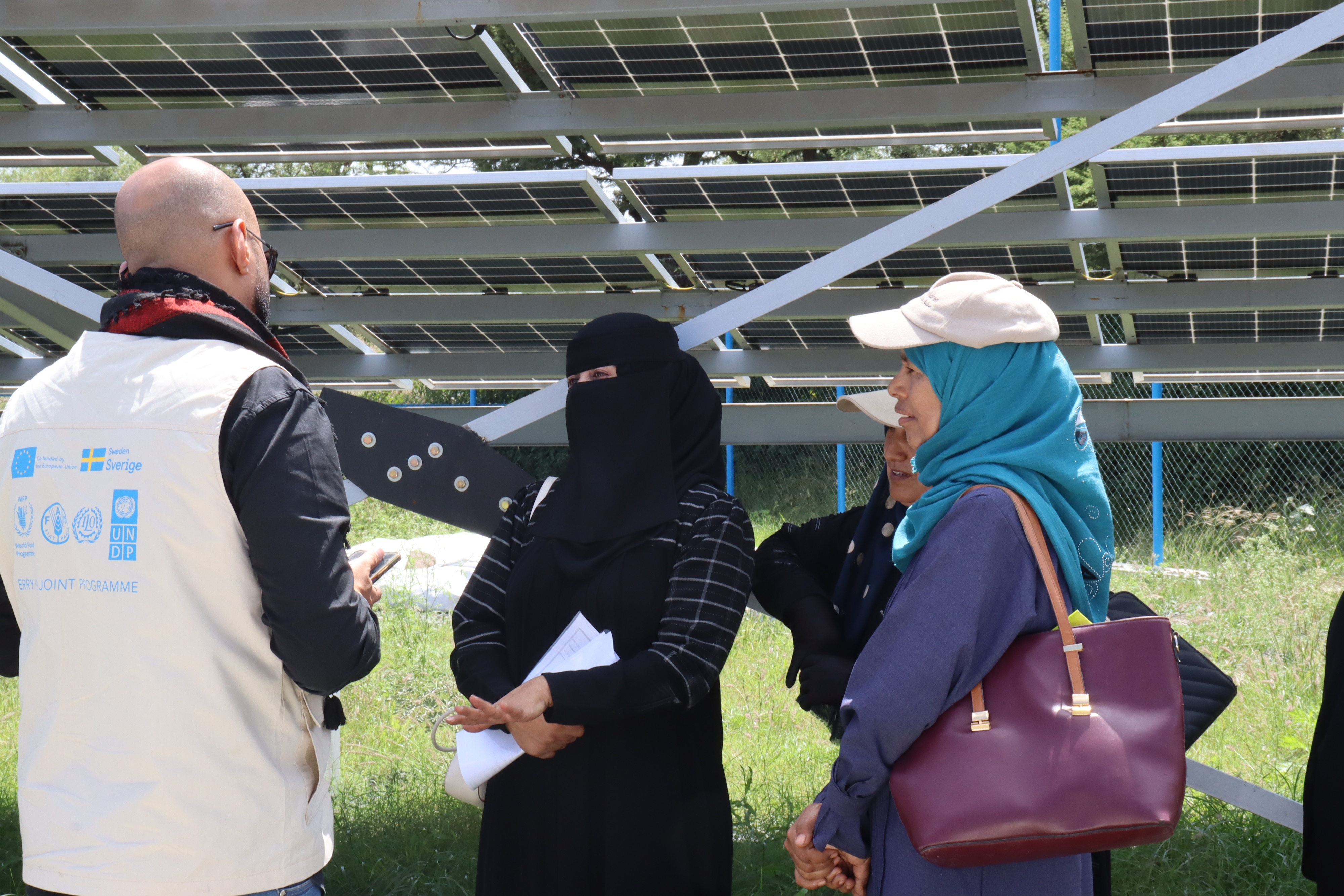“When we work together, we can achieve the impossible,” says Wehdah, –Sub-district Community Committee member, Al Maafer, Taiz Governorate, Yemen.
When women lead, communities thrive.
November 27, 2024

Four women who played key roles in leading the design and implementation of water initiatives in their community – Al Maafer District, Taiz Governorate, Yemen.
Overcoming challenges to sustainable water access
In Al Maafer District, Taiz Governorate, four remarkable women leaders—Hayat, Najat, Wehdah, and Rawdah—took on a challenge that no one thought possible. Supported by the European Union and Sweden as part of the ERRY III Joint Programme implemented by United Nations Development Programme (UNDP), the Food and Agriculture Organization (FAO), International Labour Organization (ILO), and the World Food Programme (WFP), the four women led a solar-powered water project that changed how their community accesses water. These women, members of the Sub-District Community Committee (SDC), overcame significant obstacles to benefit their community with support from UNDP and local partner, Social Fund for Development (SFD).
For years, the community suffered from a lack of access to clean water. Women, who bear the burden of water-related challenges, walked long distances daily to fetch water for their families, leaving little time for education, work, or family.
“The struggle for water was our daily reality, and it held our entire community back,” shares Rawdah, a community representative.
The community’s existing diesel-powered pumps were costly, inefficient, and unreliable, while the absence of a proper water storage system added to the problem. Additionally, the team faced some pessimism.
“Many thought women couldn’t manage such a project,” Hayat recalled. “But we believed in ourselves and our ability to make a difference.”

Solar panels provided by the ERRY III Joint Programme power a water project in Al-Ma’afer District, prioritized in the Community Resilience Plan to supply the entire sub-district with essential water resources – Taiz Governorate, Yemen.
Women leading the way
Determined to change their reality, the four women stepped forward and took on leadership roles in the community-driven project.
Wehdah, as the administrative officer, played a key role in developing the resilience plan for her community, ensuring that the project addressed both immediate and long-term needs. “We faced many challenges along the way, but I stayed focused on the bigger picture: ensuring that our community would finally have access to clean, reliable water,” she shared.
Hayat raised awareness about the importance of the project and rallied community support. “It wasn’t just about the water; it was about showing that women can be leaders and problem solvers.”
Najat coordinated with community members and stakeholders, ensuring everyone’s voices were heard. “I wanted this to be a project that brought everyone together, especially the women who felt forgotten in decision-making,” she said.
Rawda represented the voices of women and families, ensuring their unique needs were prioritized. “This was not just a project; it was a lifeline for our children and future generations.”
Together, they oversaw the construction of a 5,000-cubic-meter water tank and the installation of a solar-powered pumping system.
Water access benefits the whole community.
The results of the project have been life changing. Today, over 3,500 households have reliable access to clean water. The solar-powered system eliminated the need for expensive diesel pumps, saving the community an estimated 80 million Yemeni Rials per month in fuel costs. The cost of water for families has dropped by 45%, making it affordable for even the most vulnerable households.
Women, who previously spent hours fetching water, now have time to spend with their families, pursue education, or engage in income-generating activities. Girls who once dropped out of school to help fetch water are now returning to their classrooms.

Construction of a water tank, part of a water project supported by the ERRY III Joint Programme to serve the local community’s essential needs – Al Ma’afer District, Taiz Governorate, Yemen.
“We are seeing a brighter future for our daughters,” says Najah, reflecting on the social changes sparked by the project.
The project aligns with broader Sustainable Development Goals (SDGs), including clean water and sanitation (SDG 6), gender equality (SDG 5), and affordable and clean energy (SDG 7).
“We didn’t just build a water tank; we built a stronger, healthier, and more hopeful community,” says Hayat.
A legacy of leadership
Looking ahead, the four leaders have big dreams for their community. They hope the project will inspire other women to step into leadership roles and tackle the challenges their communities face.
“This is just the beginning,” shares Wehdah. “We want to see more women leading projects, solving problems, and creating a better future for all.”
The women leaders also emphasize the importance of sustainability. By relying on solar energy, the project is environmentally friendly and cost-effective, ensuring it will serve the community for years to come.
“We’ve shown that when women lead, they can build solutions that last,” says Rawdah.
Their message to other women is simple yet powerful: “Believe in yourself and your ability to create change,” emphasizes Hayat. “When women work together, nothing is impossible.”

The water project team discusses the impact of their project with the ERRY III Joint Programe team in Maafer District, Taiz Governorate, Yemen.

 Locations
Locations

